Container carriage WSD.005
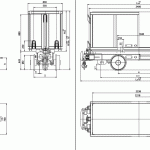 The container is designed mainly for rail transport on horizontal and sloping transport ways of loose materials, lining nets and other materials whose centre of gravity does not move when the object is being transported.
The container is designed mainly for rail transport on horizontal and sloping transport ways of loose materials, lining nets and other materials whose centre of gravity does not move when the object is being transported.
After the container has been disassembled from the undercarriage, it can be transported by an overhead narrow-gauge railway or moved by means of a forklift. The container can also be transported by means of a floor narrow-gauge railway if it is secured on the platform of the floor narrow-gauge railway (so that the container would not slip off).
If the container is transported by means of an overhead narrow-gauge railway or a floor narrow-gauge railway its load may consist of machines, devices or their elements.
Any transport should take place according to the conditions given in the technical documentation (DTR), as well as the current procedures (the Ordinance of the Minister of Economy from the 28th of June, 2002, ‘Industrial safety, transport and specialist fire security in the underground mine plants’, Journal of Laws, number 139, year 2002, pos.1169 and Journal of Laws, number 124, year 2006, position 863).
The platform may be used in the underground excavations in ‘a’, ‘b’, ‘c’ –graded compartments (methane explosion hazard), as well as A and B class for the hazard of pulverised coal explosion.
Mine Office (WUG) admission GM-9/05
Maximum load capacity of the container carriage Qw = 30 kN
Maximum load capacity of the container Qw = 30 kN
Length of the container carriage Lw = 2350 mm to 3370 mm
Breadth of the container carriage Bw = 830 mm to 1100 mm
Height of the container carriage Hw = 1200 mm to 1413 mm (ill. 1)
Hw = 1180 mm to 1393 mm (ill. 1a)
Length of the container Lk = 2470 mm
Undercarriage’s height Hk = 757 mm to 970 mm
Breadth of the container Bw = 830 mm to 1100 mm
Rail’s breadth S = 470 mm to 1000 mm
Wheel set’s wheel base a = 1000 mm
Coupling’s height h = 264, 285, 297,5 mm (ill. 1)
h = 230, 250, 262,5 mm (ill. 1a)
Road wheel’s diameter D = 310 mm, 350 mm, 375 mm
Minimum radius of the rail arc R = 8 m
Maximum velocity of transport (no load) on straight roads Vpp = 5 m/s
Maximum velocity of transport (with load) on straight roads Vtp= 1,5 m/s
Container carriage WSD.006
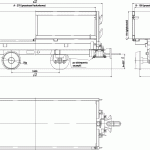 The container is designed mainly for rail transport on horizontal and sloping transport ways of palletised materials (e.g. stone dust). It is admissible to transport materials whose centre of gravity does not move when the object is being transported and according to the technical documentations conditions (DTR).
The container is designed mainly for rail transport on horizontal and sloping transport ways of palletised materials (e.g. stone dust). It is admissible to transport materials whose centre of gravity does not move when the object is being transported and according to the technical documentations conditions (DTR).
Any transport should take place according to the conditions given in the technical documentation (DTR), as well as the current procedures (the Ordinance of the Minister of Economy from the 28th of June, 2002, ‘Industrial safety, transport and specialist fire security in the underground mine plants’, Journal of Laws, number 139, year 2002, pos.1169 and Journal of Laws, number 124, year 2006, position 863).
After the container has been disassembled from the undercarriage, it can be transported by an overhead narrow-gauge railway or moved by means of a forklift. If the container is transported by means of an overhead narrow-gauge railway or a floor narrow-gauge railway its load may consist of machines, devices or their elements.
The platform may be used in the underground excavations in ‘a’, ‘b’, ‘c’ –graded compartments (methane explosion hazard, hazard degree IV), as well as A and B class for the hazard of pulverised coal explosion.
Mine Office (WUG) admission GM-122/07
Maximum load capacity of the container carriage Qw = 30 kN
Maximum load capacity of the container Qk = 30 kN
Length of the container carriage L = 2350 mm to 3370 mm
Breadth of the container carriage B = 830 mm to 1100 mm
Maximum height of the container carriage H1 = 1350 mm
Length of the container A = 1700 mm to 2810 mm
Maximum breadth of the container B = 1100 mm
Maximum height of the container C = 737 mm
Rail’s breadth S = 470 mm to 1000 mm
Wheel set’s wheel base a = 1000 mm
Coupling’s height h = 307 mm
Road wheel’s diameter D = 350 mm
Minimum radius of the rail arc R = 8 m
Maximum velocity of transport (no load) on straight roads Vpp = 5 m/s
Maximum velocity of transport (with load) on straight roads Vtp= 3,5 m/s
Carriage for lining arches transport WSŁ.001 M2
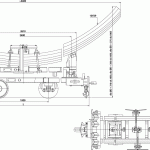 The container is designed mainly for rail transport of lining arches of the 3 or 4 – element – height of 8, 9 or 10/ V 25 and V 29 on horizontal and sloping transport ways according to the technical documentations conditions (DTR). The bodywork of the carriage can be transported on routes of the overhead narrow-gauge railways.
The container is designed mainly for rail transport of lining arches of the 3 or 4 – element – height of 8, 9 or 10/ V 25 and V 29 on horizontal and sloping transport ways according to the technical documentations conditions (DTR). The bodywork of the carriage can be transported on routes of the overhead narrow-gauge railways.
Any transport should take place according to the conditions given in the technical documentation (DTR), as well as the current procedures (the Ordinance of the Minister of Economy from the 28th of June, 2002, ‘Industrial safety, transport and specialist fire security in the underground mine plants’, Journal of Laws, number 139, year 2002, pos.1169 and Journal of Laws, number 124, year 2006, position 863).
The platform may be used in the underground excavations in ‘a’, ‘b’, ‘c’ –graded compartments (methane explosion hazard), as well as A and B class for the hazard of pulverised coal explosion.
Mine Office (WUG) admission GM-64/06
Load capacity on railways’ routes Qł = 30 kN
Load capacity on overhead railways’ routes Qł = 19 kN
- When suspended on carriages whose load capacity is 13 kN Qł = 19 kN
- When suspended on carriages whose load capacity is 16 kN Qł = 25 kN
Length of the carriage L = 2350 mm to 3370 mm
Breadth of the carriage B = 950 mm
Height of the carriage H = 1118, 1138, 1151 mm
Bodywork’s height Hn = 710 mm
Rail’s breadth S = 470 mm to 1000 mm
Wheel set’s wheel base a = 1000 mm
Coupling’s height (for a link) h1 = 266, 286, 298,5 mm
Coupling’s height (for a coupling’s hook bow) h2 = h1 – 70 mm
Coupling’s height (for a coupling’s hook) h2 = h1 – 75 mm
Road wheel’s diameter D = 310 mm, 350 mm, or 375 mm
Minimum radius of the rail arc R = 8 m
Advisable minimum radius of the rail arc R = 10 m
Maximum operational load of the bow and link couplings Ns = 35 kN
Maximum velocity of transport (no load) on straight roads Vpp = 5 m/s
Maximum velocity of transport (with load) on straight roads Vtp= 1 m/s
Carriage for lining arches transport WSŁ.009
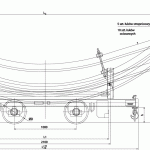 The carriage is designed mainly for rail transport of lining arches of the size of 6, 7, 8, 9, 10 from the sections of V 25 and V 29 on horizontal and sloping transport ways .
The carriage is designed mainly for rail transport of lining arches of the size of 6, 7, 8, 9, 10 from the sections of V 25 and V 29 on horizontal and sloping transport ways .
Any transport should take place according to the conditions given in the technical documentation (DTR), as well as the current procedures (the Ordinance of the Minister of Economy from the 28th of June, 2002, ‘Industrial safety, transport and specialist fire security in the underground mine plants’, Journal of Laws, number 139, year 2002, pos.1169 and Journal of Laws, number 124, year 2006, position 863).
The carriage may be used in the underground excavations in ‘a’, ‘b’, ‘c’ –graded compartments (methane explosion hazard), as well as A and B class for the hazard of pulverised coal explosion.
Mine Office (WUG) admission GM-194/04
The number of transported lining sets (per one carriage) i = 10 pcs.
Maximum load capacity Qł = 35 kN
Length with no load L = 2800 mm to 3200 mm
Breadth B = 941 mm
Height of the carriage with no load:
- Wheel’s diameter of 310 mm H = 860 mm
- Wheel’s diameter of 350 mm H = 880 mm
- Wheel’s diameter of 375 mm H = 902, 5 mm
Rail’s breadth S = 550 mm to 1000 mm
Wheel set’s wheel base a = 1000 mm
Coupling’s height h = 230 mm to 270 mm
Road wheel’s diameter :
- For the rail’s breadth of S = 550 mm to 950 mm D = 310 mm, or 350 mm
- For the rail’s breadth of S = 1000 mm D = 375 mm
Maximum towing power by means of the towing system Ns = 25 kN
Minimum radius of the rail arc R = 10 m
Maximum velocity of transport (no load) on straight roads Vpp = 5 m/s (18 km/h)
Maximum velocity of transport (with load) on straight roads Vtp= 3,5 m/s (12 km/h)
Carriage for mining materials transport WMG.001
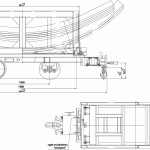 The carriage is designed mainly for rail transport of double timber elements of the lining heading (arches and stirrups) along with the lining elements (lining nets etc.) and long elements (pipes, wood). Other elements, such as cables, chains, bags with dust stone, machines, devices and their elements, can also be transported if the open-work construction secures those elements from moving beyond the carriage’s outline, or if they are fastened. All loads that might be moved during the transport should be fastened to the dispenser (using the fastening points) by means of strings whose length can be regulated that would unable any moving.
The carriage is designed mainly for rail transport of double timber elements of the lining heading (arches and stirrups) along with the lining elements (lining nets etc.) and long elements (pipes, wood). Other elements, such as cables, chains, bags with dust stone, machines, devices and their elements, can also be transported if the open-work construction secures those elements from moving beyond the carriage’s outline, or if they are fastened. All loads that might be moved during the transport should be fastened to the dispenser (using the fastening points) by means of strings whose length can be regulated that would unable any moving.
After the dispenser has been disassembled from the undercarriage, it can be transported by means of the overhead narrow-gauge railways.
Any transport should take place according to the conditions given in the technical documentation (DTR), as well as the current procedures (the Ordinance of the Minister of Economy from the 28th of June, 2002, ‘Industrial safety, transport and specialist fire security in the underground mine plants’, Journal of Laws, number 139, year 2002, pos.1169 and Journal of Laws, number 124, year 2006, position 863).
The carriage may be used in the underground excavations in ‘a’, ‘b’, ‘c’ –graded compartments (methane explosion hazard), as well as A and B class for the hazard of pulverised coal explosion.
Mine Office (WUG) admission GM – 101/06
Carriage’s load capacity Qw = 30 kN
Dispenser’s load capacity Qk = 30 kN
Carriage’s length Lw = 2800 mm to 3120 mm
Carriage’s breadth Bw = 860 mm to 1100 mm
Carriage’s height Hw = 1250 mm to 1750 mm
Dispenser’s length Lk = 2000 mm to 2760 mm
Dispenser’s height Hk = 800 mm to 1300 mm
Dispenser’s breadth Bk = 860 mm to 1100 mm
Rail’s breadth S = 470 mm to 950 mm
Wheel set’s wheel base a = 1000 mm
Coupling’s height by means of a link h1 = 266, 286, 298,5 mm
Coupling’s height by means of a link-hook coupling h1 = 286 mm
Road wheel’s diameter D = 350 mm
Minimum radius of the rail arc R = 8 m
Maximum velocity of transport (no load) on straight roads Vpp = 5 m/s
Maximum velocity of transport (with load) on straight roads Vtp= 1 m/s
Small carriage for ancillary materials transport WMP
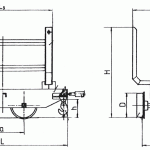 This kind of carriages is used for transport of ancillary materials such as: pipes, rails, sections, timber, net linings, tape coils (conveyor belts for example), props (hydraulic props, for example) whose weight does not exceed the permissible load capacity of carriages according to the technical documentation (DTR).
This kind of carriages is used for transport of ancillary materials such as: pipes, rails, sections, timber, net linings, tape coils (conveyor belts for example), props (hydraulic props, for example) whose weight does not exceed the permissible load capacity of carriages according to the technical documentation (DTR).
Any transport should take place according to the conditions given in the technical documentation (DTR), as well as the current procedures (the Ordinance of the Minister of Economy from the 28th of June, 2002, ‘Industrial safety, transport and specialist fire security in the underground mine plants’, Journal of Laws, number 139, year 2002, pos.1169 and Journal of Laws, number 124, year 2006, position 863).
These carriages may be used in the underground excavations in ‘a’, ‘b’, ‘c’ –graded compartments (methane explosion hazard), as well as A and B class for the hazard of pulverised coal explosion.
Length L = 1270 to 1580 mm
Breadth B = 700 mm to 950 mm
Height H = 1100 mm and 1300 mm
Rail’s breadth S = 470 mm to 900 mm
Wheel set’s wheel base a = 410 mm to 900 mm
Road wheel’s diameter D = 310 mm or 350 mm
Undercarriage’s height hs = 335 mm, 355 mm
Coupling’s height h = 240 mm, 260 mm
Maximum load capacity Q = 20 kN
Minimum radius of the rail arc R = 6 m
Maximum velocity of transport (no load) on straight roads Vpp = 5 m/s (18 km/h)
Maximum velocity of transport (with load) on straight roads Vtp= 3 m/s (10 km/h)
Medium carriage for ancillary materials transport WSP
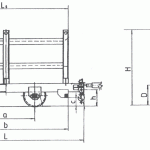 This kind of carriages is used for transport of ancillary materials such as: pipes, rails, sections, timber, net linings, tape coils (conveyor belts for example), props (hydraulic props, for example) whose weight does not exceed the permissible load capacity of carriages according to the technical documentation (DTR).
This kind of carriages is used for transport of ancillary materials such as: pipes, rails, sections, timber, net linings, tape coils (conveyor belts for example), props (hydraulic props, for example) whose weight does not exceed the permissible load capacity of carriages according to the technical documentation (DTR).
Any transport should take place according to the conditions given in the technical documentation (DTR), as well as the current procedures (the Ordinance of the Minister of Economy from the 28th of June, 2002, ‘Industrial safety, transport and specialist fire security in the underground mine plants’, Journal of Laws, number 139, year 2002, pos.1169 and Journal of Laws, number 124, year 2006, position 863).
These carriages may be used in the underground excavations in ‘a’, ‘b’, ‘c’ –graded compartments (methane explosion hazard, hazard degree IV), as well as A and B class for the hazard of pulverised coal explosion.
Length L = 2330 to 3400 mm
Breadth B = 700 mm to 1064 mm
Height H = 1050 mm and 1500 mm
Rail’s breadth S = 470 mm to 950 mm
Wheel set’s wheel base a = 500 mm to 1600 mm
Road wheel’s diameter D = 310 mm or 350 mm or 375 mm
Undercarriage’s height hs = 340 mm, 420 mm
Coupling’s height h = 210 mm, 310 mm
Maximum load capacity Q = 30 kN
Minimum radius of the rail arc R = 8 m
Maximum velocity of transport (no load) on straight roads Vpp = 5 m/s (18 km/h)
Maximum velocity of transport (with load) on straight roads Vtp= 3 m/s (10 km/h)
Non-standard carriage for ancillary materials transport WNP
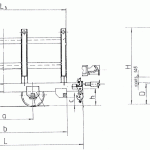 This kind of carriages is used for transport of ancillary materials such as: pipes, rails, sections, timber, net linings, tape coils (conveyor belts for example), props (hydraulic props, for example) whose weight does not exceed the permissible load capacity of carriages according to the technical documentation (DTR).
This kind of carriages is used for transport of ancillary materials such as: pipes, rails, sections, timber, net linings, tape coils (conveyor belts for example), props (hydraulic props, for example) whose weight does not exceed the permissible load capacity of carriages according to the technical documentation (DTR).
Any transport should take place according to the conditions given in the technical documentation (DTR), as well as the current procedures (the Ordinance of the Minister of Economy from the 28th of June, 2002, ‘Industrial safety, transport and specialist fire security in the underground mine plants’, Journal of Laws, number 139, year 2002, pos.1169 and Journal of Laws, number 124, year 2006, position 863).
These carriages may be used in the underground excavations in ‘a’, ‘b’, ‘c’ –graded compartments (methane explosion hazard, hazard degree IV), as well as A and B class for the hazard of pulverised coal explosion.
Length L = 2500 to 3120 mm
Breadth B = 860 mm to 1540 mm
Height H = 1000 mm and 1300 mm
Rail’s breadth S = 750 mm to 1000 mm
Wheel set’s wheel base a = 1000 mm to 1100 mm
Road wheel’s diameter D = 350 mm or 375 mm
Undercarriage’s height hs = 390 mm, 400 mm
Coupling’s height h = 230 mm, 310 mm
Maximum load capacity Q = 30 kN
Minimum radius of the rail arc R = 8 m
Maximum velocity of transport (no load) on straight roads Vpp = 5 m/s (18 km/h)
Maximum velocity of transport (with load) on straight roads Vtp= 3 m/s (10 km/h)
Carriage for long materials transport WDDŁM
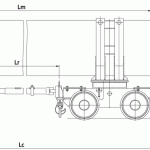 This kind of carriages are designed for transport of long materials like wood, pipes, sections, etc. whose mass does not exceed 5 tons on horizontal and sloping transport ways (a ≤ 15°) according to the regulations.
This kind of carriages are designed for transport of long materials like wood, pipes, sections, etc. whose mass does not exceed 5 tons on horizontal and sloping transport ways (a ≤ 15°) according to the regulations.
Any transport should take place according to the conditions given in the technical documentation (DTR), as well as the current procedures (the Ordinance of the Minister of Economy from the 28th of June, 2002, ‘Industrial safety, transport and specialist fire security in the underground mine plants’, Journal of Laws, number 139, year 2002, pos.1169 and Journal of Laws, number 124, year 2006, position 863).
These carriages may be used in the underground excavations in ‘a’, ‘b’, ‘c’ –graded compartments (methane explosion hazard, hazard degree IV), as well as A and B class for the hazard of pulverised coal explosion.
Types of carriages:
Depending on the rail’s breadth there are three sizes and breadths of the B carriages:
- For S=470 mm to 535 mm, B = 760 mm
- For S = 550 mm to 750 mm, B = 860 mm
- For S > 750 mm, B = 1000 mm
The length of carriages of the L1 carriage also depends on the rail’s breadth:
- For S = 470 mm to 550 mm, L1 = 1280 mm
- For S > 550 mm, L1 = 1480 mm.
Mine Office (WUG) admission GM – 98/07
Length Lc = 4070 mm to 7170 mm
Breadth B = 700 mm to 1540 mm
Height H = 1000 mm to 1200 mm
Rail’s breadth S = 470 mm to 1000 mm
Wheel set’s wheel base in the undercarriage a = 600, 800 mm
Undercarriage’s height b = 445, 463, 465 mm
Coupling’s height (by means of a nagging piece) h1 = 320, 340 mm
Coupling’s height (by means of a hook) h2 = 240, 260 mm
Road wheel’s diameter D = 310, 350 or 375 mm
Maximum load capacity Q = 50 kN
Minimum radius of the rail arc R = 8 m
Maximum velocity of transport (no load) on straight roads Vpp = 5 m/s
Maximum velocity of transport (with load) on straight roads Vtp= 3,5 m/s
Carriage for loose materials transport WSS
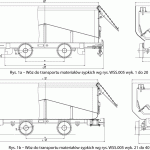 These carriages are designed for the transport of loose materials (sand, gravel, aggregate, broken stone, stone, gangue, sub-crust) provided that the carriage’s capacity will be used in proportion with the mass of the transported materials.
These carriages are designed for the transport of loose materials (sand, gravel, aggregate, broken stone, stone, gangue, sub-crust) provided that the carriage’s capacity will be used in proportion with the mass of the transported materials.
The transport may take place on horizontal and sloping transport roads whose angle ≤ 15° and is in accordance with the valid regulations.
Any transport should take place according to the conditions given in the technical documentation (DTR), as well as the current procedures (the Ordinance of the Minister of Economy from the 28th of June, 2002, ‘Industrial safety, transport and specialist fire security in the underground mine plants’, Journal of Laws, number 139, year 2002, pos.1169 and Journal of Laws, number 124, year 2006, position 863).
These carriages may be used in the underground excavations in ‘a’, ‘b’, ‘c’ –graded compartments (methane explosion hazard), as well as A and B class for the hazard of pulverised coal explosion.
Mine Office (WUG) admission GM – 153/05
Volume of the carriage’s case 1 to 20 V = 1634 dcm3
Volume of the carriage’s case 21 to 40 V = 1750 dcm3
Length of the carriage 1 to 20 L = 3000 mm
Length of the carriage 21 to 40 L = 3120 mm
Breadth of the carriage 1 to 20 B = 960 mm
Breadth of the carriage 21 to 40 B = 1100 mm
Height of the carriage 1 to 20 H = 1320 mm
Height of the carriage 21 to 40 H = 1350 mm
Rail’s breadth S = 470 mm to 950 mm
Wheel set’s wheel base in the undercarriage a = 1000 mm
Coupling’s height in the 1 to 20 carriage h = 230 mm to 250 mm
Coupling’s height in the 21 to 40 carriage h = 309 mm
Road wheel’s diameter D = 310 mm or 350 mm
Maximum load capacity Q = 35 kN
Minimum radius of the rail arc R = 8 m
Maximum velocity of transport (no load) on straight roads Vpp = 5 m/s
Maximum velocity of transport (with load) on straight roads Vtp= 3,5 m/s
Small, medium and large carriage for mining explosives materials transport WSm, Wss and WSd
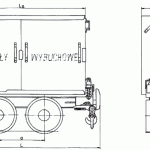 These carriages are designed for the transport of mining explosives on horizontal transport ways. Packages with mining explosives, especially when the carriage’s case is not full, should be placed evenly on the case’s surface and secured from being moved.
These carriages are designed for the transport of mining explosives on horizontal transport ways. Packages with mining explosives, especially when the carriage’s case is not full, should be placed evenly on the case’s surface and secured from being moved.
Any transport should take place according to the conditions given in the technical documentation (DTR), as well as the current procedures (the Ordinance of the Minister of Economy, Labour and Social Policy from the 1st of April, 2003, ‘Storage and use of explosives materials in the mining plants’, Journal of Laws, number 72, position 655; the Ordinance of Minister of Economy from the 28th of June, 2002, ‘Industrial safety, transport and specialist fire security in the underground mine plants’, Journal of Laws, number 139, year 2002, pos.1169 and Journal of Laws, number 124, year 2006, position 863).
These carriages may be used in the underground excavations in ‘a’, ‘b’, ‘c’ –graded compartments (methane explosion hazard), as well as A and B class for the hazard of pulverised coal explosion.
The temperature for the transport and use of explosives materials cannot exceed 50°C.
Types of carriages:
Depending on the maximum load capacity:
- Small carriages for the transport of mining explosives materials whose load capacity does not exceed 6 kN
- Medium carriages for the transport of mining explosives materials whose load capacity does not exceed 8 kN
- Large carriages for the transport of mining explosives materials whose load capacity does not exceed 10 kN
Technical data:
Mine Office (WUG) admission GM – 5/06 | GM – 5/06 | GG – 5/06
Maximum capacity of the carriage Q = 6 | Q = 8 | Q = 10 kN
Length L = 1130 to 1450 | L = 1390 to 1730 | L = 1590 to 1730 mm
Breadth B = 740, 860 | B = 740, 860 | B = 860 mm
Height H = 1120 to 1385 | H = 1290 to 1385 | H = 1290 to 1385 mm
Rail’s breadth S = 470 to 600 mm | S = 470 to 900 mm | S = 470 to 1000 mm
Wheel set’s wheel base in the undercarriage a = 410 to 500 | a = 450 to 500 | a = 450 t 780 mm
Coupling’s height h = 265 | h = 265 | h = 265 mm
Road wheel’s diameter D = 310 or 350 | D = 310 or 350 | D = 310 or 350 mm
Minimum radius of the rail arc R = 6 | R = 6 | R = 6 m
Maximum velocity of transport (no load) on straight roads Vpp = 5 | Vpp = 5 | Vpp = 5 m/s
Maximum velocity of transport (with load) on straight roads Vtl = 3,5 | Vtl = 3,5 | Vtl = 3,5 m/s
Carriage for containers transport WPo.001
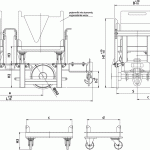 These carriages are designed for the transport of maximum 3 containers for solid waste, clean water, tool containers and small materials (hereinafter referred to as ‘load’).
These carriages are designed for the transport of maximum 3 containers for solid waste, clean water, tool containers and small materials (hereinafter referred to as ‘load’).
Other containers, dispensers may also be transported provided that they are properly placed on the carriages. The aforementioned containers and dispensers are not part of the factory equipment of the carriage.
Any transport should take place according to the conditions given in the technical documentation (DTR), as well as the current procedures (the Ordinance of the Minister of Economy from the 28th of June, 2002, ‘Industrial safety, transport and specialist fire security in the underground mine plants’, Journal of Laws, number 139, year 2002, pos.1169 and Journal of Laws, number 124, year 2006, position 863).
These carriages may be used in the underground excavations in ‘a’, ‘b’, ‘c’ –graded compartments (methane explosion hazard), as well as A and B class for the hazard of pulverised coal explosion.
Maximum load capacity Q = 20 kN
Length Lmax = 3120 mm
Breadth Bmax = 1100 mm
Height Hmax = 1300 mm
Rail’s breadth S = 470 mm to 1000 mm
Wheel set’s wheel base in the undercarriage a = 1000 to 1200 mm
Coupling’s height (by means of a hook) h = 220 to 270 mm
Road wheel’s diameter D = 310 or 350 mm
Minimum radius of the rail arc R = 8 m
Maximum velocity of transport (no load) on straight roads Vpp = 5 m/s
Maximum velocity of transport (with load) on straight roads Vtl = 3 m/s
Carriage for technical gases large bottles transport WB.001
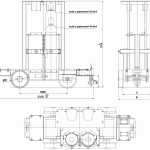 The carriages is designed for the rail transport of max. 4 technical gases bottle in the horizontal position. The capacity of the bottles may range from 40 to 50 dm³.
The carriages is designed for the rail transport of max. 4 technical gases bottle in the horizontal position. The capacity of the bottles may range from 40 to 50 dm³.
Any transport should take place according to the conditions given in the technical documentation (DTR), as well as the current procedures (the Ordinance of the Minister of Economy from the 28th of June, 2002, ‘Industrial safety, transport and specialist fire security in the underground mine plants’, Journal of Laws, number 139, year 2002, pos.1169 and Journal of Laws, number 124, year 2006, position 863).
These carriages may be used in the underground excavations in ‘a’, ‘b’, ‘c’ –graded compartments (methane explosion hazard), as well as A and B class for the hazard of pulverised coal explosion.
Mine Office (WUG) admission GM – 61/09
The number of transported bottles i = 4 pcs
Length L = 2100 mm
Breadth Bmax = 785 mm
Height Hmax = 1800 mm
Rail’s breadth S = 470 mm to 1000 mm
Wheel set’s wheel base in the undercarriage a = 1000 mm
Coupling’s height h = 250 mm t 270 mm
Road wheel’s diameter D = 310 or 350 mm
Maximum load capacity Q = 5 kN
Maximum mass of the carriage M ≈ 800 kg
Minimum radius of the rail arc R = 8 m
Maximum velocity of transport (no load) on straight roads Vpp = 5 m/s
Maximum velocity of transport (with load) on straight roads Vtp= 4 m/s
Maximum operational load of the coupling Nsp = 35 kN
Carriage for cables and lines transport WKL.001
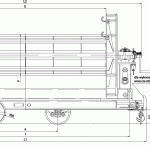 The carriage is designed for the rail transport of cables and lines on horizontal and sloping transport ways.
The carriage is designed for the rail transport of cables and lines on horizontal and sloping transport ways.
If a reel is placed on the undercarriage it may be transported individually or by means of overhead narrow-gauges and/or floor rails.
Any transport should take place according to the conditions given in the technical documentation (DTR), as well as the current procedures (the Ordinance of the Minister of Economy from the 28th of June, 2002, ‘Industrial safety, transport and specialist fire security in the underground mine plants’, Journal of Laws, number 139, year 2002, pos.1169 and Journal of Laws, number 124, year 2006, position 863).
These carriages may be used in the underground excavations in ‘a’, ‘b’, ‘c’ –graded compartments (methane explosion hazard, IV hazard degree), as well as A and B class for the hazard of pulverised coal explosion.
Technical data
Carriage’s and reel’s load capacity Qw = 50 kN
Length of the carriage Li = max. 3750 mm
Breadth of the carriage B2 = max. 1350 mm
Height of the carriage H1 + H2 = max. 1750 mm
Reel’s length L2 = max. 3600 mm
Reel’s length H2 = max. 1330 mm
Reel’s breadth B2 = max. 1300 mm
Rail’s breadth S = max. 1000 mm
Wheel base a = max. 1500 mm
Undercarriage’s height H1 = max. 420 mm
Undercarriage’s breadth B1 = max. 1150 mm
Coupling’s height (by means of a link) h1 = max. 304 mm
Coupling’s height (by means of a hook) h2 = max. 383 mm
Road wheel’s diameter D =350 mm
Minimum radius of the rail arc R = 8 m
Maximum velocity of transport (no load) on straight roads Vpp = 5 m/s
Maximum velocity of transport (with load) on straight roads Vtp= 1 m/s
Maximum sloping angle for the rail transport roads a ≤ 15°
Mine carriage for 12 persons WO M2
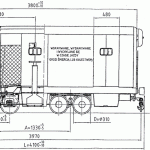 The carriage is designed for the transport of max. 12 persons on horizontal ways, whose radius of curvature equal R ≥10m. These carriages may be used in the underground excavations in ‘a’, ‘b’, ‘c’ –graded compartments (methane explosion hazard, IV hazard degree), as well as A and B class for the hazard of pulverised coal explosion.
The carriage is designed for the transport of max. 12 persons on horizontal ways, whose radius of curvature equal R ≥10m. These carriages may be used in the underground excavations in ‘a’, ‘b’, ‘c’ –graded compartments (methane explosion hazard, IV hazard degree), as well as A and B class for the hazard of pulverised coal explosion.
Obeying these rules is the condition for the safe transport of people.
Any transport should take place according to the conditions given in the technical documentation (DTR), as well as the current procedures (the Ordinance of the Minister of Economy from the 28th of June, 2002, ‘Industrial safety, transport and specialist fire security in the underground mine plants’, Journal of Laws, number 139, year 2002, pos.1169 and Journal of Laws, number 124, year 2006, position 863).
Mine Office (WUG) admission GM – 64/07
The number of transported persons 12 persons
Length L = 4100 mm
Breadth Bmax = 950 mm and 1100 mm
Height Hmax = 1600 mm
Rail’s breadth S = 470 mm to 1000 mm
Undercarriage’s wheel base A = 1330 mm
Wheel set’s wheel base in the undercarriage a = 430 mm
Coupling’s height (by means of a nagging piece) h1 = 420 mm
Coupling’s height (by means of a hook) h2 = 250 mm
Road wheel’s diameter D = 310 mm
Minimum radius of the rail arc R = 10 m
Maximum velocity of transport (no load) on straight roads v = 3,5 m/s
Maximum operational load of the coupling Ns1 = 35 kN
Maximum sloping angle for the rail transport roads a ≤ 4°
Overhead tape loading elevators Montana PTP 065M and 080M
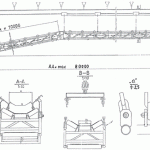 The overhead tape loading elevators are used when preparing the preparatory works and when new mining plants are being opened out.
The overhead tape loading elevators are used when preparing the preparatory works and when new mining plants are being opened out.
Depending on the purpose, the tape loading elevators may be used as:
- Mobile – they cooperate with the heading machine (connected to it) and with the supplying device (conveyors, loading elevators, carriages)
- Stationary – their return stations are fastened to the floor
They are used to transport the winning from the loading elevator or any other allowed conveyor that is fastened to the heading machine, or from the winning machine such as the floorloader onto another conveyor or a mining carriage.
The loading elevators may be used in excavations whose sloping angle is adequate to the allowed range of the work of the loading elevator and of the heading machine.
The overhead tape loading elevators are a modern construction solution of Śl. F. U. G. MONTANA S.A. in Katowice.
Their advantages are among others:
- Max. Length of no more than 80 cm enables the operating works being conducted up until 5 days without the need to reline the conveyor that receives winning from the loading elevator
- The possibility to use the tape whose breadth is 650 mm or 800 mm
- Compact construction – minimized size
- Easy and fast assembly of the conveyor’s route by means of special connections
- Relatively small route’s mass, the spatial pipe construction provides rigidity
- Use of hinged segments in order to level the irregularities of surface in the vertical plane
- The possibility of changing the angle of the side muller
- The possibility of using self-positioning mullers
- The tape is stretched by means of a hydraulic cylinder sling – back in the return station’s construction that has a telescopic construction
- The driving station may be equipped with one or two power units
- The loading elevator is slung in its horizontal part to the rails by means of carriages, and the return station is fastened to the heading machine by means of a ball joint
Our loading elevators meet safety requirements and are admitted by the Mine Office (WUG), and its high quality has been confirmed by the ISO 9001 Quality Certificate admitted in 2001.
Driving station
Electric engines 11kW or 15 kW
Gear AM 50 – 11/13
Driving reel tyre, diameter 425 mm x L
Tape scraper – spring
Return station
return reel/smooth reel, diameter 273 mm x L
plow or one-sided scraper bucket
hydraulic cylinder to stretch the tape
telescopic system of stretching the tape
Supporting structure
-route
repeatable elements whose length is 3 m create stiff spatial tube construction
hinged segments
upper mullers, diameter 89 x 250 mm (315)
lower mullers, diameter 89 x 750 mm (950)








